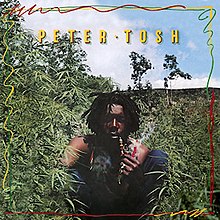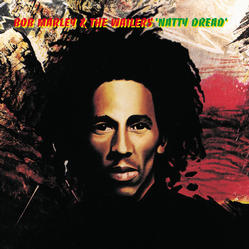
Natty Dread is the seventh album by Bob Marley and the Wailers, released in 1974. Previously Marley had recorded with Peter Tosh and Bunny Wailer as the Wailers, and this was his first record without them.
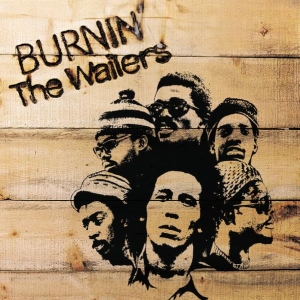
Burnin' is the sixth album by Jamaican reggae group the Wailers, released in October 1973. It was written by all three members and recorded and produced by the Wailers in Jamaica, contemporaneously with tracks from the Catch a Fire album with further recording, mixing and completion while on the Catch a Fire tour in London. It contains the song "I Shot the Sheriff". It was the last album before Marley, Peter Tosh and Bunny Wailer decided to pursue solo careers, while continuing their local releases through their company Tuff Gong Records. A commercial and critical success in the United States, Burnin' was certified Gold and later added to the National Recording Registry, with the Library of Congress deeming it historically and culturally significant.

Catch a Fire is the fifth studio album by the reggae band The Wailers, released in April 1973. It was their first album released by Island Records. After finishing a UK tour with Johnny Nash, they had started laying down tracks for JAD Records when a disputed CBS contract with Danny Sims created tensions. The band did not have enough money to return to Jamaica, so their road manager Brent Clarke approached producer Chris Blackwell, who agreed to advance The Wailers money for an album. They instead used this money to pay their fares back home, where they completed the recordings that constitute Catch a Fire. The album has nine songs, two of which were written and composed by Peter Tosh; the remaining seven were by Bob Marley. While Bunny Wailer is not credited as a writer, the group's writing style was a collective process. For the immediate follow-up album, Burnin', also released in 1973, he contributed four songs. After Marley returned with the tapes to London, Blackwell reworked the tracks at Island Studios, with contributions by Muscle Shoals session musician Wayne Perkins, who played guitar on three overdubbed tracks. The album had a limited original release under the name The Wailers in a sleeve depicting a Zippo lighter, designed by graphic artists Rod Dyer and Bob Weiner; subsequent releases had an alternative cover designed by John Bonis, featuring an Esther Anderson portrait of Marley smoking a "spliff", and crediting the band as Bob Marley and the Wailers.
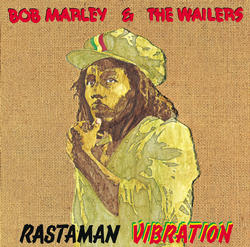
Rastaman Vibration is the eighth studio album by Jamaican reggae band Bob Marley and the Wailers, released in April 1976.

Bob Marley and the Wailers were a Jamaican ska, rocksteady and reggae band. The founding members, in 1963, were Bob Marley, Peter Tosh, and Bunny Wailer.
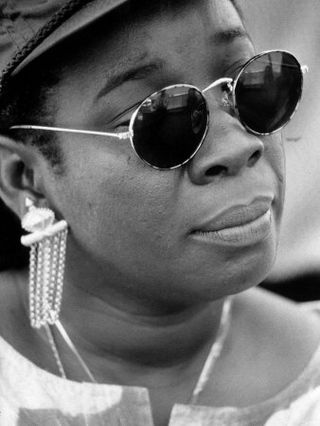
Alfarita Constantia "Rita" Marley OJ OD is a Cuban-born Jamaican singer-songwriter and entrepreneur. She is the widow of reggae legend Bob Marley. Along with Marcia Griffiths and Judy Mowatt, Rita was a member of the reggae vocal group the I Threes, the backing vocalists for Bob Marley and the Wailers.
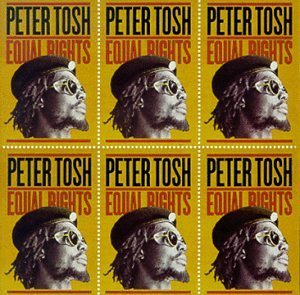
Equal Rights is the second studio album by Peter Tosh. It was released in 1977 on Columbia Records.

Soul Rebels is the second studio album by the Wailers, their first album to be released outside Jamaica. The Wailers approached producer Lee "Scratch" Perry in August 1970 to record an entire album, and the sessions took place at Randy's recording studio above Randy's Record Mart at 17 North Parade in Kingston, Jamaica, until November. First issued in the UK by Trojan Records in December 1970, the album has since been re-released several times on several different labels. Perry's production is sparse and haunting, only featuring guitar, bass, drums, electronic organs, and vocals with no horns or other embellishments.
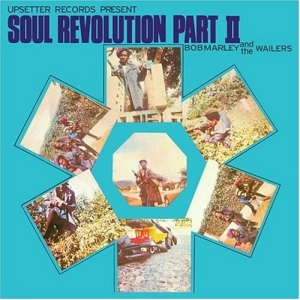
Soul Revolution Part II is the third album by Bob Marley and the Wailers. It was produced by Lee "Scratch" Perry. While the name on the album cover for all the original releases was Soul Revolution Part II, some releases had the name Soul Revolution printed on the album label, leading to uncertainty over what name was intended. A "dub" version with the vocals removed was released as Soul Revolution Part II Dub; both versions were released as one set in 1988. The album was repackaged with additional material as African Herbsman in 1973.
The One Love Concert (OLPC) was a large concert held on 22 April 1978 at the National Stadium in Kingston, Jamaica.

The Wailing Wailers is the 1965 eponymous debut studio album by the Wailers, later known as Bob Marley and the Wailers. Released on the Studio One label, the album is a compilation of various recordings made between 1964 and 1965 by Neville “Bunny” Livingston, Robert Nesta Marley and Peter McIntosh. It compiles what Clement Coxsone Dodd considered the best Wailers recordings from this period. They were accompanied by the Studio One backing band, The Soul Brothers.

Blackheart Man is the debut album by Bunny Wailer, originally released on 8 September 1976, in Jamaica on Solomonic Records and internationally on Island Records.
Carlton "Santa" Davis is a musician from Jamaica, primarily known for his drumming with bands such as Bob Marley & The Wailers, The Aggrovators, Soul Syndicate and Roots Radics. He has worked with reggae artists such as Jimmy Cliff, Black Uhuru, Burning Spear, Big Youth, The Wailers, Peter Tosh, Andrew Tosh, Wailing Souls, Ini Kamoze, Big Mountain, Michael Rose, and Ziggy Marley.
Andrew Tosh is a Jamaican reggae singer and the son of Peter Tosh. He is the nephew of reggae singer Bunny Wailer, also an original member of the Wailers. Andrew has a strong vocal resemblance to his late father and like his father, rides the unicycle.

Donald Kinsey was an American guitarist and singer, best known as a member of the Word Sound and Power Band, the reggae backing group for Peter Tosh.

Marley is a 2012 documentary-biographical film directed by Kevin Macdonald documenting the life of Bob Marley.
The Complete Bob Marley & the Wailers 1967–1972 is a series of compilation albums by Bob Marley and the Wailers released in eleven volumes by JAD Records between 1997 and 2002.

Neville O'Riley Livingston, known professionally as Bunny Wailer, was a Jamaican singer-songwriter and percussionist. He was an original member of reggae group The Wailers along with Bob Marley and Peter Tosh. A three-time Grammy Award winner, he is considered one of the longtime standard-bearers of reggae music. He was also known as Jah B, Bunny O'Riley, and Bunny Livingston.

Winston Hubert McIntosh, professionally known as Peter Tosh, was a Jamaican reggae musician. Along with Bob Marley and Bunny Wailer, he was one of the core members of the band the Wailers (1963–1976), after which he established himself as a successful solo artist and a promoter of Rastafari. He was murdered in 1987 during a home invasion.
"No Sympathy" is a reggae song, written by Peter Tosh and originally recorded by Bob Marley and the Wailers for their 1970 album, Soul Rebels. Tosh later included it on his 1976 debut solo album, Legalize It. The British rock musician Eric Clapton recorded the song during his sessions for his 2013 studio album Old Sock. Although his take on "No Sympathy" was not released on the original Old Sock studio album, it was made available as an online digital single and was released on the limited bonus track edition of the 2013 album.
